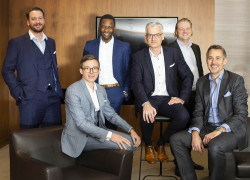CEOs rewrite the rulebook in pursuit of growth
CEOs are faced with a stark choice. In the face of unparalleled environmental, economic and technological change, they are looking to grow their businesses by creating the organizational agility to disrupt existing business models and challenge long-held market orthodoxies.
According to the fifth KPMG International Global CEO Outlook, just over half of CEOs are confident they will succeed but are realistic, with 53 percent projecting cautious three-year growth of up to 2 percent (down from 55 percent in 2018). As with 2018, they are also maintaining a positive three-year growth outlook for the global economy, although this has slightly fallen from 67 to 62 percent over the last 12 months. This confidence is also shown by their commitment to hire, with 36 percent of CEOs projecting to add more than six percent to their workforce in the next three years.
“A successful CEO now needs to be an agile CEO,” said Bill Thomas, Global Chairman, KPMG International. “Succeeding in a world of volatility and uncertainty requires different leadership skills, particularly in large, multi-national organizations. It’s no longer a question of simply defending your position and using scale to maintain competitive advantage. Today, CEOs need to be comfortable disrupting their business models by forging new strategic partnerships, considering alternate M&A strategies and increasing the skills of their workforces.”
Pascal Denis, KPMG Luxembourg’s Head of Advisory, confirms that the trend seen at global level reflects the state of mind of CEOs in Luxembourg: “72% of CEOs in Luxembourg agree that growth relies on their ability to challenge and disrupt business norms. Up to 84% of them furthermore strongly agree that they need to improve their innovation processes and execution. This is even more than in 2018! Does it represent a real wakeup call?”
Pascal Denis continues: “In Luxembourg, there is a strong understanding that technology must be embraced while an important human aspect is maintained. The survey results clearly reflect this, with 60% of Luxembourg CEOs wanting their employees to feel empowered to innovate without fearing negative consequences if their initiative fails. Furthermore, three quarters of the CEOs expect to upskill 40–60% of their current workforce with new digital capabilities. The race for talent will thus become crucial in the next few years—56% of the respondents in Luxembourg admitted finding it challenging to find the workers they need.”
Climate change driving a multi-risk operating environment
CEOs named climate change the biggest risk to their organization’s growth, the first time in five years it was rated a top concern compared to technological, territorial, cyber and operational risks. But with only a small margin between each of them, it paints a picture of a complex and ever shifting risk landscape.
Pascal Denis reflects on the how CEOs in Luxembourg see climate change affecting their business: “64% of Luxembourg CEOs take personal responsibility in ensuring their organization's ESG policies to reflect the values of their customers. One in five also ranked making an environmental and socio-economic impact as their top motivator (it was the second motivator overall). A majority (68%) are struggling to link their growth strategy to a wider societal purpose for the organization, which shows a clear sign that they want to find a solution. Finally, 40% believe that they have to see beyond purely financial growth if we as a society are to achieve long-term, sustainable success.”
The innovation disconnect
A majority of CEOs (84 percent) believe a ‘fail-fast’ culture is required in today’s marketplace, in which lessons from failures are learned quickly, yet only 56 percent say that kind of culture is in place in their organization. Eight out of ten CEOs (84 percent) are looking to change the makeup of their leadership teams to disrupt the status quo.
Cyber security to innovation
Cyber continues to be high on the CEO agenda, despite falling from the second highest risk last year to fourth this year. In 2019, a larger group of CEOs (69 percent vs 55 percent in 2018) say a robust cyber security strategy is critical to driving trust with key stakeholders and most (71 percent) view information security as a key factor in their broader innovation strategy.
Pascal Denis comments: “Luxembourg is showing signs of improvement in that field, as none of the CEOs indicated being underprepared for a cyber-attack (24% felt still underprepared in 2018). Still, only 36% consider themselves well or very well prepared. CEOs in Luxembourg need to invest in cybersecurity capabilities if they want to remain competitive and address customers’ needs. According to IBM, the average cost of a data breach is $3.86 million, with an average value of $148 per record—not counting the loss in reputation.”
Acquiring expertise through M&A
For many CEOs, M&A presents the best opportunity to upgrade digital capabilities with pace. A proactive M&A strategy is on the agenda for 84 percent of CEOs who have a moderate or high M&A appetite for the next three years. Driving this appetite is the ability of M&A to transform a business model faster than organic growth. We clearly have seen M&A becoming more frequent in Luxembourg as well.
Capital investment
When asked to prioritize between buying new technology or developing their workforce to improve their organization’s resilience, CEOs favored technology two to one (68 vs 32 percent).
AI experts take note
Artificial intelligence (AI) is on the minds of CEOs, yet only 16 percent have implemented AI and automation programs. A further 31 percent are still at the pilot stage, while 53 percent admit to undertaking a limited AI implementation. Yet 65 percent of CEOs believe the inclusion of AI and automation will create more jobs than it eliminates.
Concludes Denis, “All together, this year’s survey is telling us that we’ve entered a new era of leadership. Agility comes from balancing a CEO’s instinct with having confidence in what the data is telling you. Strategic decisions require data that has bias removed. It’s no longer enough to seek “big” data, instead CEOs must use technology to uncover quality data. Only through this will they create the organizational resilience to drive growth. This is also a reality in Luxembourg where we have seen the evolution from a generic digitalization debate towards more specific conversations with our clients around technology-driven transformation, data management & AI, customer experience improvement, culture and leadership change, and not to forget M&A and restructuring in the last year.”
To view additional information about the study please visit www.kpmg.com/CEOoutlook. You can also follow the conversation @KPMG on Twitter and Instagram using #CEOoutlook.
Communiqués liés
David Capocci re-elected Managing Partner of KPMG Luxembourg
Following the Managing Partner election process within KPMG Luxembourg, on Monda...
KPMG creates a better future
KPMG Luxembourg is proud to announce it has reached double-digit growth this yea...
Luxembourg private bankers consolidate their lead within EU
Cost controls, outsourcing and Brexit effect boost bottom line.
KPMG choisit BPI Real Estate pour développer son futur siè...
« Nous n'imaginons pas un avenir meilleur, nous le construisons. »
KPMG reaches sustainable growth thanks to talented teams and...
KPMG Luxembourg announces today a steady growth of 8% in revenue for the three f...
KPMG bolsters its Tax management team with experienced profi...
KPMG today announces new Partners and Directors joining the firm to bolster the ...
Il n'y a aucun résultat pour votre recherche





